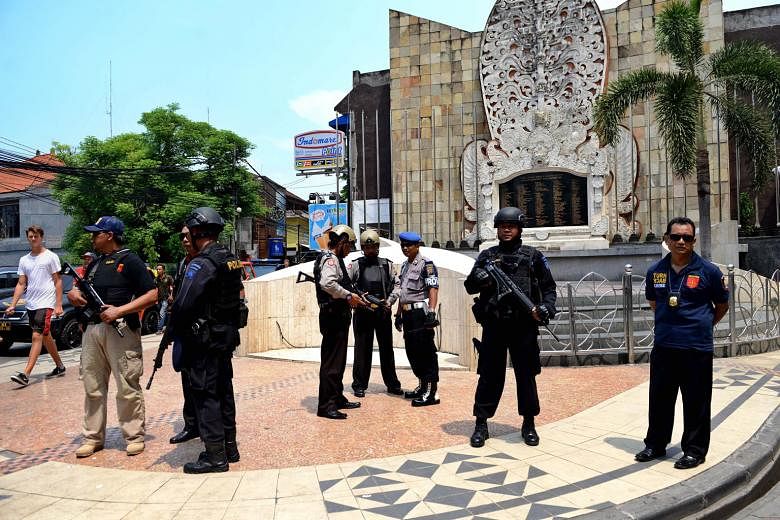Indonesia's police will be able to execute raids, make arrests and detain terror suspects for interrogation, based solely on intelligence reports, under a new law being proposed in the wake of the siege on Jakarta.
This will help security forces react faster to prevent a repeat of the Jan 14 attack in the capital, which claimed eight lives, including that of four militants, said Coordinating Minister for Political, Legal and Security Affairs Luhut Pandjaitan.
Mr Luhut, whose ministry is leading the legislative reforms to the anti-terror law, said on Wednesday that a draft of the Bill will be ready and submitted to President Joko Widodo for review next Monday.
"Under the amendments, police can use intelligence reports as preliminary evidence to make pre-emptive arrests and start interrogation," he said.
"So if there is reasonable suspicion that a group of suspects are discussing, say, a plan to attack with bombs, or to organise paramilitary training, with this new law, we can promptly stop their plot."
Under current laws, anything short of hard evidence requires that terror suspects be released after seven days of being picked up for questioning by the police. Hard evidence may include, among other things, witness statements, audio recordings, or video footage from closed-circuit television cameras, as well as other information gathered overtly during investigations.
When intelligence or other information gathered covertly is involved, counter-terrorism investigators must present it to a Chief Justice or a deputy for endorsement before they can act.
These police applications, however, often lapse - sometimes because of backlogged cases and insufficient senior judges to hear such cases. Thus, the opportunity to apprehend a suspect is lost.
The new Bill, however, allows any judge to make a decision on whether an arrest or raid based on intelligence updates can be executed.
That, said Jakarta-based terrorism analyst Adhe Bhakti, could be the game changer because it not only plugs gaps in the legal system but also speeds up the process for the police.
Indonesia's anti-terrorism law, enacted in 2003 following the 2002 Bali bombings that killed 202 people, can punish anyone who runs a terrorist cell. However, it falls short of extending punishment to anyone pledging support to or joining groups such as the East Indonesia Mujahidin extremist group based in Poso, Central Sulawesi, or the Islamic State in Iraq and Syria (ISIS).
This has been a bugbear for the police, often hampering their ability to put terrorists behind bars or prevent terror suspects from carrying out attacks.
The chief of Indonesia's defence force, General Gatot Nurmantyo, yesterday lamented the lack of tougher anti-terror laws, enabling many Indonesians to receive military training from ISIS to return and get away with it.
The country's National Counter-Terrorism Agency estimates that 2.7 million Indonesians may be directly or indirectly linked to terror activities. Some 1,000 people in Indonesia, which has the world's largest Muslim population, may also be loyal to ISIS.
The four militants who struck at a busy intersection in Central Jakarta two weeks ago, for instance, were from the West Indonesia Mujahidin. But the so-called "Jakarta Four" had also pledged allegiance to ISIS, as did the two Indonesian radicals - Bahrun Naim and Aman Abdurrahman - suspected to have helped orchestrate the strike.
Some have cautioned that the proposed overarching powers of arrest will require oversight to prevent abuse. But Mr Luhut explained that an additional clause on the proposed Act will require police to present the intelligence to a court, to rule if the detention is lawful.
Security experts such as Mr Adhe and Ms Susan Sim, a former intelligence analyst and now vice-president for Asia of New York-based The Soufan Group, say the new law, if passed, will give counter-terrorism forces more bite in the war on terror in Indonesia.
"There is this phrase special forces use, 'Left of bang', meaning before the bomb goes off," said Ms Sim. "That is what good actionable intelligence is about, making sure that you are left of bang - that you get the bad guys before the damage is done."

